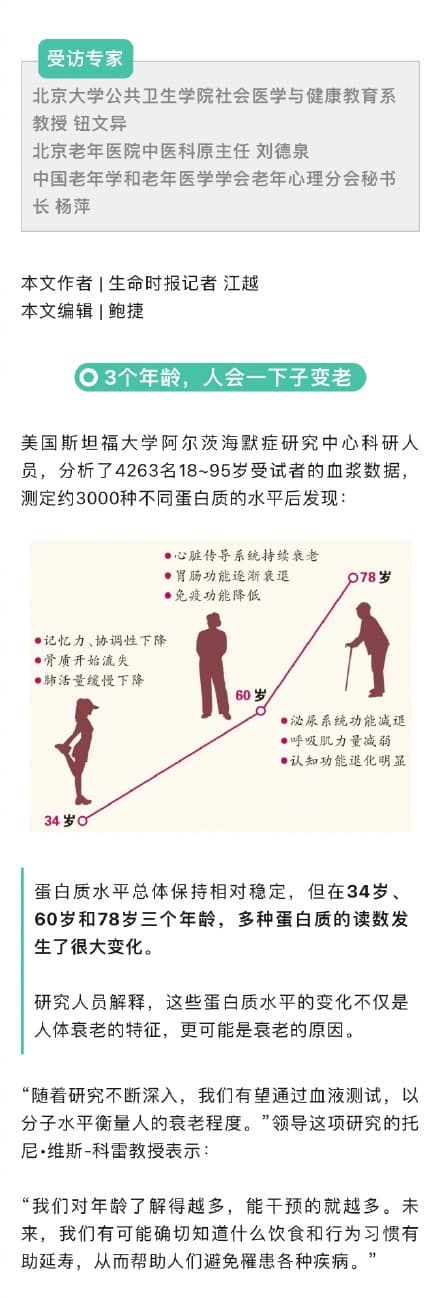Breakthrough Study Identifies Critical Ages Where Human Body Exhibits Accelerated Aging
Breakthrough Research on Age-Related Protein Levels Shifts the Paradigm of Aging

22 February 2024
In a groundbreaking study published in Nature Aging, researchers from Stanford University have unearthed evidence that suggests aging may not occur at a consistently steady pace. This study analyzed blood plasma samples from 4,263 participants aged 18 to 95 and identified three specific ages where the human body exhibits distinctive signs of accelerated aging.
The three critical ages identified are 34, 60, and 78. At these junctures, the levels of several proteins in the blood experienced significant fluctuations, a phenomenon that the research team believes could be a direct cause of aging.
"Our study paints a new picture of aging. Instead of a steady decline, our body seems to age in spurts during these critical points in our lives," says Tony Wyss-Coray, a neurology professor at Stanford University and lead scientist of the research.
His team found that age-related changes in protein levels were more than just charts and graphs - they were biologically significant. Proteins associated with heart function, gut health, immune responses, muscle strength, cognitive function, and urinary tract performance all demonstrated marked variations at these junctures.
Surprisingly, the overall levels of these proteins remained relatively stable throughout life, suggesting that it's not aging that causes these changes but rather these distinctive protein level shifts are the cause of aging. The researchers plan to use these findings to develop a blood test that can accurately measure an individual's biological age, not just chronological age, improving our understanding of aging and paving the way for targeted interventions.
"Aging isn't a uniform process. It's an accumulation of many different changes that happen at different times and in different ways. By understanding these changes, we can find ways to slow down or even reverse some aspects of aging," explains Wyss-Coray.
His team's research paints a more nuanced picture of the human lifespan and raises intriguing questions about the lifestyle choices and habits that might influence how quickly we age.
For instance, the study suggests that new evidence of aging appears at 34, 60, and 78, not necessarily at the extremes of life but at critical junctures. This paints a different picture where aging is not a linear process but a series of spikes at specific points.
Wyss-Coray's findings resonate with the Chinese social media sphere known as Weibo. The topic has garnered significant attention, with users actively sharing and discussing the study. Some users jokingly pointed out the connection between the identified critical ages and their personal experiences, humorously suggesting that they experienced a "breakwall aging" at these points.
One user humorously shared, "When my daughter was born, it felt like I aged 34 years overnight!" Another user quipped, "At age 60, I felt like I aged 30 years because I had to take more responsibility for my family. But at age 78, I really felt like I aged several decades when I experienced a major health issue."
Despite the occasional light-hearted jabs, the study has also generated a serious conversation on Weibo, with many users highlighting the importance of maintaining a healthy lifestyle to mitigate the effects of aging. They emphasized the significance of regular exercise, a balanced diet, and adequate sleep in delaying the age-related protein level shifts.
One user commented, "It's not just about living longer; it's about living better. We need to take care of ourselves not just for today but for the future. Even small steps like going for a walk or eating more fruits and vegetables can make a big difference."
Another user recommended a lecture series on longevity by Fan Yi, a researcher at the Chinese Academy of Sciences. The user described the lecture as "easy to understand and full of practical advice on how to stay young."
As the study continues to make waves on social media, further research is required to delve deeper into this intriguing aspect of aging. The study from Stanford University has not only shifted our perspective on how our body ages but also highlighted the critical junctures where we experience significant changes. It has underscored the importance of a healthy lifestyle in mitigating the effects of aging and has opened up new avenues for targeted interventions in delaying the onset of aging.
Reflecting on this groundbreaking study, Wyss-Coray said, "The more we understand about aging, the better equipped we are to delay it or even reverse some aspects of it. By knowing your body's biological age, you can make more informed decisions about diet, exercise, and lifestyle choices, ultimately helping you live a longer and healthier life."


